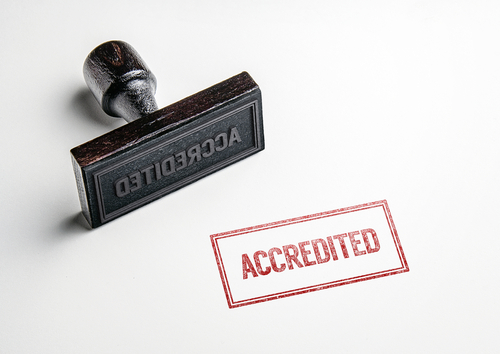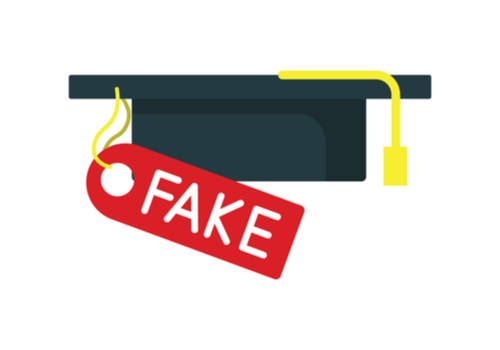
A diploma mill is a pejorative term for an institution of higher education that is not accredited by any pertinent governing bodies, but still charges a fee for diplomas without requiring applications, coursework, or other benchmarks of a worthwhile institution. This is considered a scam since the diplomas issued by these institutions are typically worthless. Read on to learn more about the warning signs of a this type of scam and how to avoid getting taken in by an illegitimate educational institution.
What Are the Warning Signs of Diploma Mills?
While many schools of this type are difficult to spot, knowing the warning signs and red flags can help you avoid wasting your money on a worthless diploma. If an online college offers to sell you a diploma based on your life experience, work experience, or other credentials without having you apply or set foot in a classroom, it is not a legitimate diploma. If the website lists no courses or faculty, or only faculty who are accredited by similar institutions, avoid giving them your money. It’s also a red flag if the “school” is located in a foreign country but only grants degrees in the U.S., or has only a post office box instead of a street address. According to the Better Business Bureau, a diploma mill may have a name that’s very similar to that of a legitimate institution. These schools typically charge a flat fee for your “degree” rather than bill on a per-credit basis for the coursework you actually complete.
While “diploma mill” or “degree mill” can be used as pejoratives, particularly against real, accredited colleges, the terms are merely accurate when describing the scammers who prey upon unwary prospective students. The worst kind of these dubious companies are those that take people’s money, deliver high-pressure sales pitches for more classes, and don’t even deliver on the promise to provide students with the fraudulent degree. Trump University was a prime example of this worst kind of degree mill. It was not even a legitimate university and wound up being sued for even calling itself such.
Be on the lookout for lack of information in classes and these high-pressure sales tactics. They’re designed to get people to buy the educational equivalent of a cockroach-infested time share. Real colleges almost never charge a single fee for legitimate classes. They either charge by the credit hour or figure tuition based on a variety of costs that include the credit hours of the classes studied.
Mills are also not accredited by either the United States Department of Education or one of the six regional accrediting organizations:
- The Higher Learning Commission
- Middle States Commission on Higher Education
- New England Commission of Higher Education
- Northwest Commission on Colleges and Universities
- Southern Association of Colleges and Schools Commission on Colleges
- WASC Senior College and University Commission
For community colleges, there is also the Accrediting Commission for Community and Junior Colleges. These organizations have rigorous standards of both academic excellence and the highest ethics. Their examinations are so in-depth that they must only be performed once every 10 years. Full accreditation means that the college or university meets all of the exacting standards. Schools sometimes fail in one or more of these categories, but these accrediting organizations realize that no one is perfect and give the institutions that fail a chance to rectify the problems before officially pulling their accreditation.
Mills, on the other hand, change accreditation as much as they can. A lot of the time, they create false accrediting bodies in the same way as other unscrupulous business people create shell corporations to launder money. Additionally, in the same way that shipping companies register their ships in countries with lax laws and business-friendly tax policies, mills will often base their operations in such countries because they lack any kind of appropriate accreditation system.
Always remember, too, that the scammers will almost always lie to you about their own mill and laws about education. One of the most common lies is that international colleges aren’t allowed to be accredited in the U.S. They tell people this lie to try to bolster their false accreditations. They follow this up with a promise to deliver people their diplomas in 30 days or fewer.
People usually get wise to the scam and complain about these mills with the Better Business Bureau or similar organizations. Unfortunately, many of them are already out thousands of dollars for fake doctorates, master’s degrees, or other advanced awards. Prospective students would be wise to search out the name of any online college or university with these consumer watchdog groups to see if there is a long line of complaints. It’s also possible that mills have been slapped with either citations or criminal charges in the past, so it would be a good idea, too, for people to check with both state and federal agencies to see if there have been any legal actions taken against the school in question.
Mills also only ask for a valid credit card as an admission policy. Although an academic institution that requires no previous coursework, transcripts, letters of reference, essays, or other usual admission criteria should raise a red flag with anyone who applies, many people seeking shortcuts to higher degrees either ignore the warning signs or don’t know what they are.
How Do Diploma Mills Work?
To avoid detection, the purveyors of this type of scam change the name of the institution, move from state to state as well as to foreign countries, and exploit those areas with the weakest educational laws. They often have high-pressure salespeople on the team that prey on those who may not be familiar with the higher education landscape and can easily get taken in by this type of scam.
Because they are fly-by-night by definition, mills that change addresses constantly also constantly change their look online. Marketing is their No. 1 priority, and they go to great lengths to look legitimate. They also routinely change the names of their “universities” so that people who get scammed once might not recognize the same process somewhere else.
Many mills are part of conglomerates of other mills that are run by overseas businesses. The largest of these was named Axact, and they oversaw hundreds of these scam universities. They created fancy-sounding names that are similar to those of Ivy League universities or famous names. Some of these included:
- Harvey University
- Barkley University
- Nixon University
It must be borne in mind that fake diplomas are a billion-dollar industry around the world. They are nearly ubiquitous, so law enforcement is sometimes stymied. Every time they shut one down, five more crop up elsewhere. Often, the perpetrators are overseas and out of the relevant jurisdiction, and by the time North American law enforcement liaises with, for example, Pakistan’s police to shut down Axact or similar organizations, the criminals have “flown the proverbial coop.” Fortunately, enough law enforcement worked together to bring down Axact in 2015.
Mills also spend good money creating official-looking diplomas, transcripts, and other documents. They even claim to have dissertations on file from those people who purchase Ph.D.s. Of course, the dissertations usually wind up being plagiarized and the transcripts fabricated to give the illusion of completed coursework. As unbelievable as it may seem, many mills, not just those that were run by Axact in the past, will haggle and negotiate price over how many degrees the student wants, in which subjects, and what kind of distinctions come along with it, such as summa cum laude or dean’s list. A real university never haggles over tuition.
Investigators who monitored and eventually held Axact to account also point out that going into something that seems too good to be true can have lasting consequences for the students that include possible charges against them for fraud, losing thousands of dollars, and being blacklisted from their chosen field for using fake credentials.
How Can You Spot Legitimate Online Colleges?
Many online colleges enjoy excellent, well-deserved reputations. First, make sure that the program that you’re interested in is accredited by the necessary governing body. This should be either the e Council on Higher Education Accreditation (CHEA) or the U.S. Department of Education, or an entity recognized by one of these agencies. A list of these agencies is available online. When in doubt, stick to an online program that’s associated with a well-respected university that also has physical locations. While most legitimate colleges have a .edu address, this alone is not proof of legitimacy.
The best method is to study at a traditional university that offers online programs. When a traditional university receives its regional accreditation, it also includes its online programs. Many universities also offer hybrid programs that provide both online and brick-and-mortar classes. Students studying medical or scientific subjects will need to go somewhere to perform laboratory work, for example.
There are, too, fully legitimate online universities, many of which are designed to accommodate nontraditional students, such as adult learners who are already in the workforce and cannot attend classes at strict times regularly. In the gig economy, adult learners are far more common than they’ve ever been.
As stated, the first thing students should do is look up the accreditation for the university in question. That includes established universities too. Any college can lose accreditation for any one of a number of things even it’s an Ivy League school. Granted, that’s not likely, but students lose nothing by looking it up. Be sure that the accreditation comes from one of the six regional accrediting organizations listed above or from the Department of Education. There are certain universities that don’t qualify for regional accreditation but are still legitimate institutions. They qualify for national accreditation rather than regional.
Students should remember that nationally accredited colleges and universities, although mostly for-profit organizations, are legitimate. They usually teach vocational or technical programs rather than academic programs. Many award certificates rather than degrees, but these certificates qualify students for jobs in their chosen fields.
Secondly, students should be sure to check the accrediting agencies of the accredited schools in which they’re interested. The six regional organizations and the national accrediting agencies that are run by the U.S. Department of Education are all legitimate. Most others are not. They might have impressive names and websites full of official-sounding claims, dotted with graphics from every organization under the sun, both real and imaginary, but if they’re not approved by the Department of Education, then they’re not legitimate.
Study the faculty biographies that real colleges will post. Contact them. They will usually respond personally. Watch out for colleges and universities that use stock photos. Perform image searches on the faculty photos. If they’re stock, they’ll show up all over the place. If they’re real, they may show up in a few places, most likely associated with the university. Contact accrediting organizations and ask about the college you plan to attend, particularly if it’s not a well-known college. There’s nothing wrong with lesser-known institutions, but one never can be too careful.
The United States Bureau of Labor also maintains data on job placement in various fields, and students can cross-reference these data with information they can get from real colleges about their graduates’ success rates in finding and keeping jobs. This has the added benefit of showing students which fields are growing and which fields are not.
With the advent of the Internet and the poor state of the economy, diploma mills have been given opportunity to thrive in the United States. To learn more about diploma mills as well as what to do if you suspect or have been taken in by an educational scam, visit the U.S. Department of Education online.
There are many pitfalls when it comes to seeking online education. Both diploma mills and degree mills are predatory companies only looking to make a quick profit and provide nothing of value. They will promise the moon and the stars, but students will only receive fake credentials, huge bills, and possible visits from the police. It cannot be stated often enough or emphatically enough: When it comes to one’s education, things that are too good to be true always are. However, students who take reasonable precautions and seek out a true education from an accredited institution will be able to earn a real degree or certificate that carries significant weight in the job market. Success is not a “get-educated-quick” scheme no matter what the hucksters and scammers say.
Related Resources:
- What is the Difference Between a MOOC and an Online Degree Program?
- Top 30 Small Non-Profit Colleges for an Online Degree
- 5 Great Jobs You Can Get with an Online Degree
- 5 Tips for Earning an Online Degree While in the Military
- Can Active Service Members Earn an Online Degree?
- How Do Employers View an Online Degree?
- How is an Online Degree Viewed in the Job Market?
- What are the Most Popular Online Degrees?
- How Can I Tell if an Online College is Reputable?



